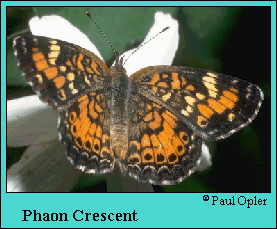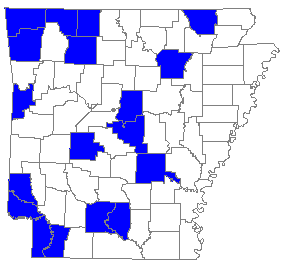 |
 

 |



Phaon Crescent (Phyciodes phaon [W. H. Edwards])
Wing span: 1 - 1 1/2 inches (2.5 - 3.8 cm).
Identification: Forewing is dark orange and black with a pale cream median band. Underside of hindwing is cream to yellowish; spring and fall butterflies (form marcia) have a gray hindwing.
Life history: Males patrol during daytime near the host plant. Eggs are laid in small groups on underside of host plant leaves; caterpillars eat leaves.
Flight: Many broods: all year long in the tropics, South Texas, and southern Florida; February-October in California; April-September in New Mexico.
Caterpillar hosts: Fogfruit (Lippia lanceolata) and mat grass (Lippia nodiflora) in the verbena family.
Adult food: Nectar from flowers of Lippia and composites including shepherd's needle.
Habitat: Openings in thorn forest, open areas with closely cropped plants, dunes, pastures, road edges.
Range: Guatemala north through Cuba and Mexico to southern California, east through South Texas and Florida to coastal South Carolina. Strays to eastern Colorado, Nebraska, Kansas, and Missouri.
Conservation: Not usually required.
The Nature Conservancy Global Rank: G5 - Demonstrably secure globally, though it may be quite rare in parts of its range, especially at the periphery.
Management needs: None reported.
References:
Opler, P. A. and G. O. Krizek. 1984. Butterflies east of the Great Plains. Johns
Hopkins University Press, Baltimore. 294 pages, 54 color plates.
Opler, P. A. and V. Malikul. 1992. A field guide to eastern butterflies. Peterson
field guide #4. Houghton-Mifflin Co., Boston. 396 pages, 48 color plates.
Scott, J. A. 1986. The butterflies of North America. Stanford University Press,
Stanford, Calif. 583 pages, 64 color plates.
Tilden, J. W. 1986. A field guide to western butterflies. Houghton-Mifflin Co.,
Boston, Mass. 370 pages, 23 color plates.
Author: Jane M. Struttmann
State and Regional References:
Opler, P.A. 1998. A field guide to eastern butterflies, revised format.
Houghton Mifflin Co., Boston.

